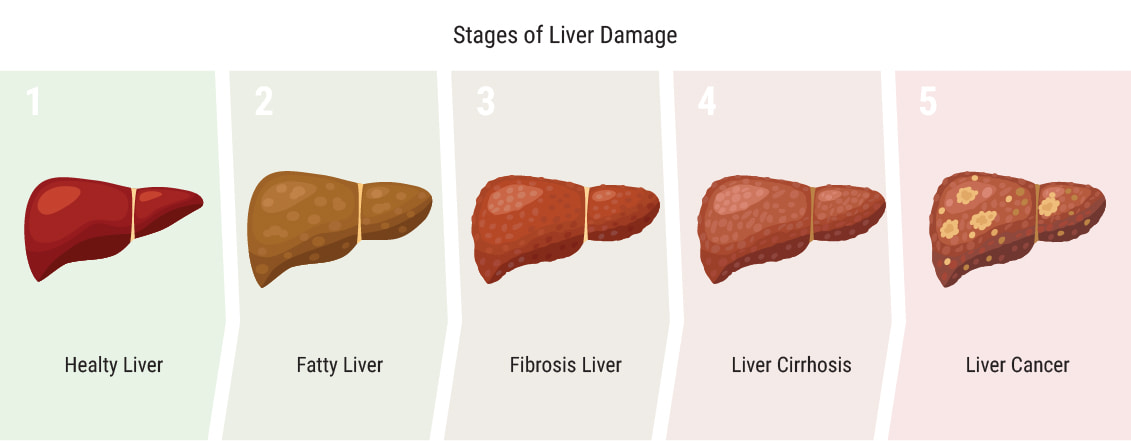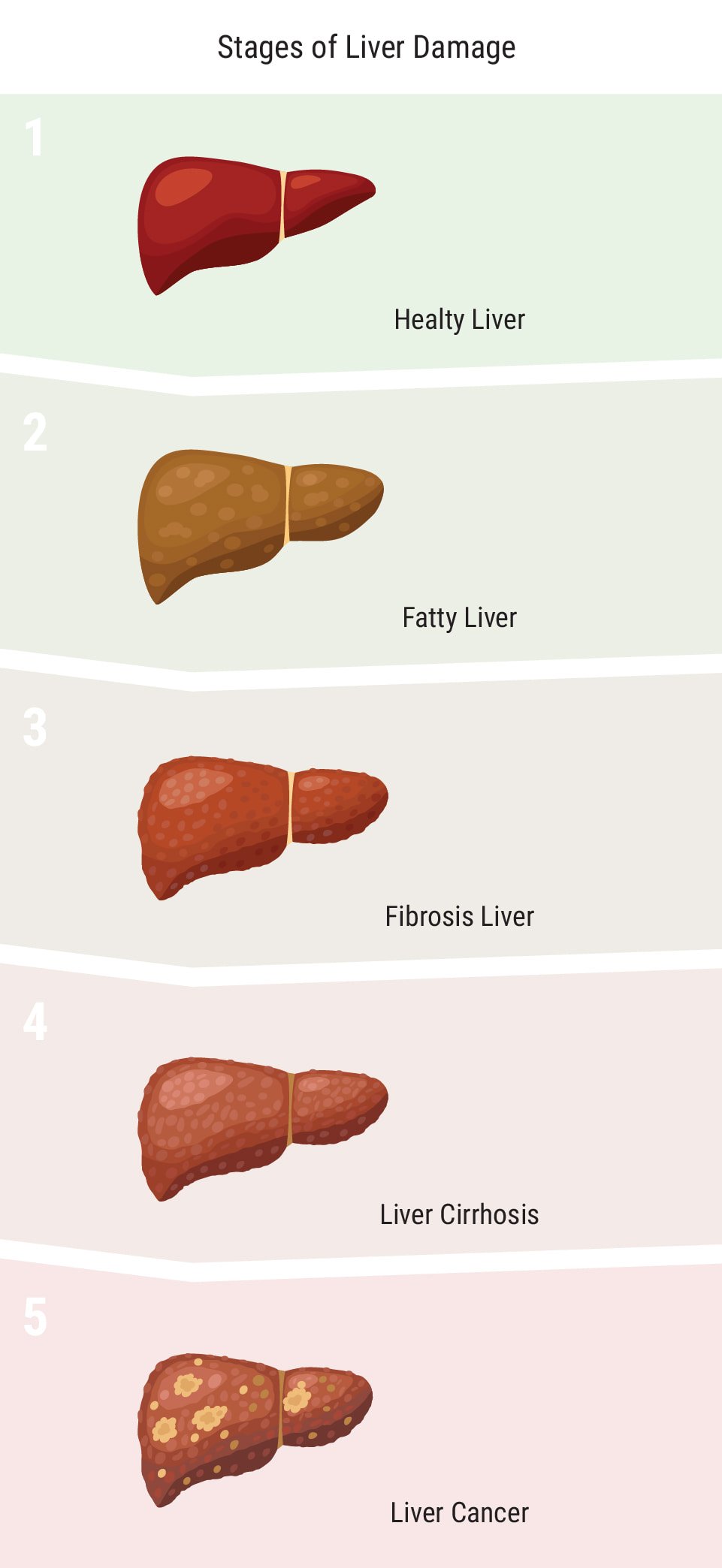.

Exploring the Research on Cannabis & CBD for Liver Issues
Today, we look into the research surrounding the effects of cannabis on liver conditions, and also explore whether cannabis could damage the liver.
Contents:
Studies have shown that in diseased livers, there is a greater expression of cannabinoid receptors[1] compared to healthy livers. Naturally, this begs the question, does marijuana affect the liver? Could it even be used to manage some of these ailments? Livers with a greater abundance of receptors will, after all, be more receptive to cannabinoids.
Many researchers are now setting out to find answers to these questions, and below we explore some of their findings.
What Is the Liver’s Function?
The liver is a fascinating organ that plays an absolutely vital role in our survival. One of its main functions is to act as a filter; taking out the good parts of what we ingest, and either leaving or detoxifying the rest, and sending this off for ejection.
It sits just below the diaphragm, mainly on the right side of the body. It has a large right lobe and a smaller left lobe, which are connected by a bundle of connective tissue that also anchors it to the abdominal wall. On average, an adult liver weighs around 49.4 oz. In a pocket beneath the liver is the gallbladder, where bile is stored. Bile is produced by the liver to break down fat.
The portal vein is one of the most important parts of the liver. It is through this vessel that blood from the digestive organs flows, bringing with it all the good and the bad. It is the liver's job to sort through this, putting the good back into our blood for use, and sending the rest to be flushed out. Vitamin K in the liver is also used to create proteins that cause blood clotting when someone gets injured.
Some of the substances that the liver has to deal with—and is surprisingly good at dealing with—are drugs.
What Are Common Liver Problems?
On the whole, livers are surprisingly robust, and can take quite a beating, even from synthetic substances they haven’t evolved to process. Nevertheless, due to various substances and diseases, livers can encounter problems, some of which are very severe.
Some of the most common liver problems are:
| Hepatitis | This virus affects the liver and, without treatment, can be fatal. It causes scarring that interferes with the organ’s ability to function properly. |
| Fatty liver disease (FLD) | This condition can be brought on by chronic alcoholism, obesity, or a sedentary lifestyle, among other causes. Fat deposits build up in the liver, reducing its function and eventually leading to liver failure. |
| Fibrosis | This is scarring of the fibrotic tissues. Again, an unhealthy lifestyle can lead to this, and if it goes unchecked, the scar tissue can become so abundant that it severely damages the liver’s ability to function. |
| Cirrhosis | This is the end-stage disease caused by fibrosis. |
| Hepatitis | This virus affects the liver and, without treatment, can be fatal. It causes scarring that interferes with the organ’s ability to function properly. |
| Fatty liver disease (FLD) | This condition can be brought on by chronic alcoholism, obesity, or a sedentary lifestyle, among other causes. Fat deposits build up in the liver, reducing its function and eventually leading to liver failure. |
| Fibrosis | This is scarring of the fibrotic tissues. Again, an unhealthy lifestyle can lead to this, and if it goes unchecked, the scar tissue can become so abundant that it severely damages the liver’s ability to function. |
| Cirrhosis | This is the end-stage disease caused by fibrosis. |
As you can see, there are a lot of things that can go wrong in the liver, and most are brought on by unhealthy lifestyle choices—primarily alcohol abuse and obesity. The liver comes into contact with everything you ingest, and bears the brunt of it too. So it’s no surprise it suffers so greatly from excessive intake of alcohol or unhealthy food.
The liver is able to repair itself, especially from conditions like FLD, if the condition is not too advanced. Conditions like fibrosis are less reversible due to the buildup of scar tissue. Any of these conditions can lead to liver failure, which is fatal if left untreated. Once the liver gets to this stage, the only solution is a liver transplant.
So, this is very much a case of prevention being the best cure.


Does Cannabis Affect the Liver?
There will always be cases where people encounter liver conditions, both through their own choices and simply through bad luck. Either way, finding effective treatments is essential to return them to good health.
Today we ask, could cannabis (especially cannabinoids) play a future role regarding liver functioning?
As it stands, research is in its infancy, and so it’s not possible to draw conclusions. What we can do, though, is look at what’s been examined so far.
Cannabis and Fibrosis
Cannabinoid receptors, particularly CB1 and CB2, are present throughout the human body in relative abundance. These receptors, along with endocannabinoids, enzymes, and other components, make up the endocannabinoid system (ECS).
Endocannabinoids are cannabinoids produced by the human body, with the two most prevalent being 2-AG and anandamide. These molecules bind to cannabinoid receptors to keep the body functioning as it should. This is also how cannabis exerts its effects; the cannabinoids in the herb interact with the ECS, producing similar yet distinct outcomes to endocannabinoids.
Usually, CB1 and CB2 receptors are very sparse in the liver. However, according to previously mentioned data, those suffering from fibrosis appear to have a potentially much higher count than those with healthy livers.
It is thought that these receptors play a role in the generation of scar tissue—a profibrogenic role[2]. In fact, it’s much more complex than this. Research by Parfieniuk and Flisiak (2008) identified the two receptors as having opposing roles. It seems that activation of the CB1 receptor has, among other consequences, profibrogenic and proinflammatory effects. For those with fibrosis, these are not good.
Conversely, they found that activation of the CB2 receptor has the opposite effects—perhaps opening a door for the treatment of fibrosis. The issue with this, however, is that THC—the main cannabinoid in cannabis—is primarily an agonist of the CB1 receptor, meaning it “activates” it.
Another study, by Hezode et al. (2005)[3], investigated the effects of smoking cannabis daily in those with fibrosis of the liver. They found the same; it appeared that activation of CB1 receptors actually hastened the development of fibrosis. But it’s not all bad. A 2011 study[4] found that activation of CB2 receptors could trigger cell death in malignant cells, reducing scar tissue.
What these pieces of research show is that the ECS, and its manipulation, may well exert a powerful effect over fibrosis. Understanding this relationship in greater depth could open the door to effective treatments in the future.


Cannabis and Fatty Liver Disease
Research investigating the potential role of cannabis in FLD is currently underway, and conflicting.
For instance, research by Purohit, Rapaka, and Shurtleff (2010)[5] found that CB1 receptors were more present in the livers of those with FLD. In turn, CB1 activation appeared to cause the development of CB2 receptors. The researchers concluded that activation of either type of receptor caused a greater buildup of fat in the liver. This was even more pronounced in those who had FLD as a consequence of hepatitis.
Likewise, a 2021 study by Berk et al.[6] examined the influence of endocannabinoid activation on non-alcoholic FLD. The research yielded similar results, pointing toward a buildup of fat in the liver. As a consequence, they concluded that understanding this effect, and modulating the receptors accordingly, could present potential treatment avenues for FLD. It is unclear, however, whether cannabis could have a role to play here.
Cannabis and Hepatitis
Viral hepatitis can cause immune-modulated liver disease. Hegde et al. (2008)[7] looked into whether modulation of T-cells with THC might have an effect on inflammation of the liver caused by hepatitis. It is important to note that this research was conducted in mice, and therefore cannot be directly extrapolated to humans.
One interesting finding, however, was that the naturally occurring endocannabinoid anandamide appeared to suppress cytokine levels. Anandamide is normally broken down fairly quickly by FAAH, a fatty acid enzyme. However, cannabidiol (CBD) works to inhibit this enzyme, thereby making a greater concentration of anandamide available to the body.
Hepatitis can be difficult to treat, and the treatments can be very taxing. Therefore, some research has sought to discover if some of the severe side effects of hepatitis treatment could be affected by cannabis or its cannabinoids. For severe hepatitis C, chemotherapy is sometimes used. Some of the most common symptoms of this treatment include nausea and anorexia. With this in mind, a study by Costiniuk, Mills, and Cooper (2008) investigated[8] whether orally administered cannabis treatments could affect these symptoms.
Cannabis and Alcoholism
Alcohol is one of the leading causes of liver disease. Even in relatively small amounts, alcohol consumption over a prolonged period can cause liver damage. Not only has cannabis been studied for its effects on liver disease, but also for its potential to help people stop drinking alcohol, thereby allowing the liver to repair itself.
For example, Prud’homme, Cata, and Jutras-Aswad (2015)[9] explored whether CBD could play a role in addictive behaviours, reviewing 14 studies; 9 in animals, 5 in humans.
Turna et al. (2019)[10] also reviewed numerous studies, finding similar results as Prud'homme et al. But as with much of this research, they also underlined the importance of conducting more clinical studies on large human groups. So far, much of the research has been conducted on animals or cells outside of the body.
While conclusions cannot yet be drawn from these findings, they demonstrate a genuine cause for more in-depth study on cannabis and alcoholism.
Can Cannabis Damage the Liver?
So, does weed affect your liver in a negative way? This is an important question, both for those with and without liver disease. To answer it, we’ll assess the effects of THC and CBD separately.
| THC |
As indicated by some of the research mentioned above, it is possible that THC, via activation of CB1 receptors, might have a negative impact on the development of scar tissue and fat buildup in the liver. However, this research focused on those with existing issues. In a homeostatic liver, the apparent lack of cannabinoid receptor expression would likely alter these results. |
| CBD |
A 2019 study on mice[11] investigated whether CBD had any hepatotoxic (liver-damaging) characteristics. Researchers administered an equivalent dose (scaled to their weight) of the highest recommended dose of Epidiolex—an FDA-approved synthetic CBD medication used to treat two rare forms of drug-resistant epilepsy. This dose did appear to affect the livers of the subjects; however, no evidence of this effect has been observed in human subjects. |
| THC |
|
As indicated by some of the research mentioned above, it is possible that THC, via activation of CB1 receptors, might have a negative impact on the development of scar tissue and fat buildup in the liver. However, this research focused on those with existing issues. In a homeostatic liver, the apparent lack of cannabinoid receptor expression would likely alter these results. |
| CBD |
|
A 2019 study on mice[11] investigated whether CBD had any hepatotoxic (liver-damaging) characteristics. Researchers administered an equivalent dose (scaled to their weight) of the highest recommended dose of Epidiolex—an FDA-approved synthetic CBD medication used to treat two rare forms of drug-resistant epilepsy. This dose did appear to affect the livers of the subjects; however, no evidence of this effect has been observed in human subjects. |
Does Cannabis Interact With Medications?
Yes. Specifically CBD. Cytochrome P450 is a liver enzyme responsible for breaking down most drugs and foreign substances. So if you’re taking medication, it is likely this enzyme that will break it down and flush it out.
The issue with CBD is that it can deactivate this enzyme (temporarily), meaning that drugs will be metabolised at a slower rate. Depending on the medication, this could lead to greater and more drawn-out side effects, or even cause liver damage.
So before taking CBD with medication (or other drugs), talk to a medical professional, as the cannabinoid could end up doing more harm than good.
However, there is a silver lining to this. This inhibition of the breakdown of certain drugs could lead the way to modulating existing treatments. For instance, a 2016 study[12] found that by introducing CBD, doses of other drugs could be lowered without affecting efficacy. It is thought that, if managed properly, this could lead to lowering drug doses and their side effects, without sacrificing the sought-after effects.
Is Cannabis Directly Related To Liver Functioning?
Clearly, those with liver disease should not reach for a smoke. But whether cannabinoids on the whole are “good” or “bad” for the liver is unclear.
What is clear is the need for more research, to discover both the good and the bad. Even where cannabis may do harm, determining its effects gives us a greater understanding of the diseases themselves, and potential treatments.
- Hepatic Cannabinoid Signaling in the Regulation of Alcohol-Associated Liver Disease | Alcohol Research: Current Reviews https://arcr.niaaa.nih.gov
- Role of cannabinoids in chronic liver diseases https://www.ncbi.nlm.nih.gov
- Daily cannabis smoking as a risk factor for progression of fibrosis in chronic hepatitis C - PubMed https://pubmed.ncbi.nlm.nih.gov
- Cannabidiol attenuates cardiac dysfunction, oxidative stress, fibrosis, inflammatory and cell death signaling pathways in diabetic cardiomyopathy https://www.ncbi.nlm.nih.gov
- Role of Cannabinoids in the Development of Fatty Liver (Steatosis) https://www.ncbi.nlm.nih.gov
- Phytocannabinoids—A Green Approach toward Non-Alcoholic Fatty Liver Disease Treatment https://www.ncbi.nlm.nih.gov
- Attenuation of experimental autoimmune hepatitis by exogenous and endogenous cannabinoids: involvement of regulatory T cells - PubMed https://pubmed.ncbi.nlm.nih.gov
- Evaluation of oral cannabinoid-containing medications for the management of interferon and ribavirin-induced anorexia, nausea and weight loss in patients treated for chronic hepatitis C virus - PubMed https://pubmed.ncbi.nlm.nih.gov
- Cannabidiol as an Intervention for Addictive Behaviors: A Systematic Review of the Evidence https://www.ncbi.nlm.nih.gov
- Cannabidiol as a Novel Candidate Alcohol Use Disorder Pharmacotherapy: A Systematic Review - PubMed https://pubmed.ncbi.nlm.nih.gov
- Molecules | Free Full-Text | Hepatotoxicity of a Cannabidiol-Rich Cannabis Extract in the Mouse Model | HTML https://www.mdpi.com
- Human Metabolites of Cannabidiol: A Review on Their Formation, Biological Activity, and Relevance in Therapy https://www.ncbi.nlm.nih.gov






































